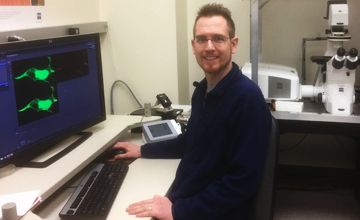
Erik Storkebaum, independent Max Planck Research group leader at the Max Planck Institute for Molecular Biomedicine in Münster, Germany, was awarded an MDA research grant totaling $291,000 over three years to study the underlying mechanisms that drive the disease process in Charcot-Marie-Tooth disease (CMT).
Familial forms of neurodegenerative diseases are caused by mutations in single genes. In an individual person, a single mutation in a neurodegeneration gene causes disease, but across a range of people, different mutations in the same disease gene typically occur. Furthermore, for a given neurodegenerative disease, distinct disease genes often encode proteins that function in the same molecular or cellular pathway.
It is unknown whether mutations in related genes, or even in a single gene, cause disease through a common molecular mechanism, or whether different mutations cause disease through disparate mechanisms. This is a key question from a therapeutic perspective, as common mechanisms may allow for unified therapeutic approaches.
Mutations in five distinct genes encoding proteins called tRNA synthetases, which play an essential role in the production of proteins in cells, all cause CMT. Storkebaum and colleagues will work with fruit fly models of CMT to determine whether different mutations across four distinct tRNA synthetase genes cause disease through the same or through disparate molecular mechanisms.
Should the results indicate that all mutations cause disease through a similar molecular mechanism, it could guide development of a common therapeutic approach to treat all forms of CMT caused by mutations in tRNA synthetases.
Funding for this MDA research grant began Feb. 1, 2017.
Grantee: Erik Storkebaum, Ph.D.
Grant type: Research Grant
Award total:
Institution:
Country:
























